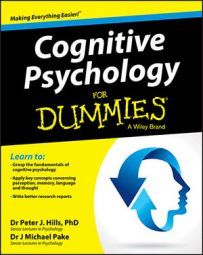Understanding long-term memory is essential in cognitive psychology. Long-term memory isn’t a unitary structure ‒ many different types of memory exist, which can independently be damaged due to brain injury. Research suggests the existence of the following different types of memory:
Episodic memory: A conscious declarative (verbalisable) memory store for recent events that have occurred.
Autobiographic memory: A declarative memory for all life events that have happened to you, usually important ones that are highly personal and emotional.
Semantic memory: A declarative memory for all facts that you’ve accumulated throughout your lifetime.
Procedural memory: An unconscious non-declarative memory for every skill or behaviour that you have.
Priming: A non-declarative memory store due to the repetition of information and its effect on behaviour and perception.
Associative learning: A non-declarative memory for unconscious associations formed between things and conditioned learning (learning based on linking two stimuli ‒ such as light and sound ‒ together sometimes with a reward).
Non-associative learning: A non-declarative memory store for habits.
 The different types of long-term memory.
The different types of long-term memory.

